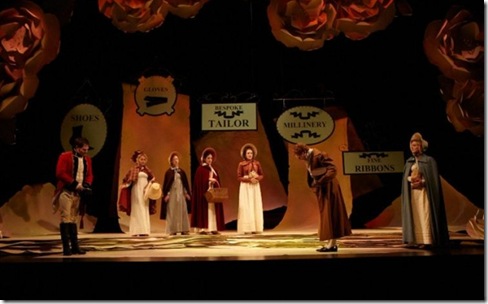Pride and Prejudice: An audience friendly production that shows the difficulty of adapting novels to the stage
Photo: Trudi Lee
This production based on an adaptation of the Jane Austen novel is essentially a crowd pleaser. Judging from the thunderous applause and the standing ovation it generated from the public of all ages when I saw it the other night, this version of the novel certainly did everything to be “audience friendly”. The set showed us very clearly that the play comes from a real book with pages flying around the stage, apparently ripped out of the manuscript as they were repossessed by the stage. The production even had moments of broad almost vulgar comedy , especially with the overblown caricatures by a giggly Mrs Bennet (M. Elizabeth Stepkowski Tarham) and Pierre Brault as Clergyman William Collins.
I must admit that Patrick Clark’s costumes were stunning and Jock Munro’s lighting captured the atmosphere beautifully, especially in the bath scene, perhaps a nod to the work of Ingres, an Austen contemporary, and in the final scene where Elizabeth Bennet (Shannon Taylor) and Mr Darcy (Tyrell Crews) at last bring themselves to admit their feelings for each other.
Even if this performed version of the book, more than any other I have ever seen (including the BBC series which was very good) reminded me constantly of a 19th century soap opera, the staging and the rather surly presence of Mr. Darcy still foreshadowed the brooding romantic heroes of English and French literature. In that sense, there was an attempt to capture the essence of the book. I`m not even certain this attempt was necessary since the adaptation made a clear point of putting its own mark on this production. Audience members who had never heard of Jane Austen could enjoy this light hearted, lively play.
This production selected important moments of the narrative yet didn’t deliver a show that emphasized the social and moral context of the period that is so important in the book. The apparently impossible meeting of the handsome, wealthy Mr, Darcy and the less fortunate Elizabeth Bennet (the second of five daughters in the Bennet household) gives rise to frustrating misunderstandings. It all glows in the fluffy flowers painted in bright pastels that were hanging on the stage, giving us the sense that this was a world of Royal Doulton figurines come to life, except the exquisitely delicate nature of that porcelain wasn’t found in this interpretation.
It all comes down to the relationship you want to recognize between the book and the play. If you disregard the book, the show is a pleasant, beautiful to watch comedy of manners, though hampered by actors who were very uncomfortable with their English accents and spoke without nuance. Some even yelled hysterically and lost much of the verisimilitude within this world of emotions. Even Shannon Taylor who played the emancipated Elizabeth Bennet who vowed to marry for love in spite of her parents, gave the impression that she was making an enormous effort simply to project her voice.
The only exception was Terry Tweed as Mr. Darcy’s aunt, Lady Catherine de Bourgh, who had a wonderful presence with a voice that commanded her aristocratic station. Lady Catherine is a woman who clearly speaks her mind, making her a breath of fresh air among these conventional individuals. Ms. Tweed brought a real sense of style to the show that the others did not begin to capture.
As clergyman William Collins, Pierre Brault who is a brilliant comic actor, was allowed to run rampant on the stage, much to the discredit of director Dennis Garnhum’s. As a result he almost became a clown, oozing obsequiousness with his greed and love of money that motivates his untiring quest to marry one of the Bennet daughters. It is true that his character would seem to be grotesque in this milieu of people so concerned with decorum and proper manners and the temptation to go over the top is very great indeed. Brault succumbed to the temptation, and that was a shame.
In spite of it, his character, clergyman Collins revealed the difficult social and financial situation of the women at that time. This is clear as we see his marriage of convenience to Charlotte (Ellen Close) who, in a very moving scene, admits to Elizabeth that she is prepared to accept the situation.
This version of Pride and Prejudice was very clearly a visually perfected crowd pleaser but with so many exciting stage plays that exist around the world that could bring as much pleasure, Ottawa audiences might welcome a broader theatrical horizon. Pride and Prejudice is an NAC English Theatre/Theatre Calgary Coproduction tht runs until December 8 in the Theatre of the NAC. Tickets: www.nac-cna.ca; In person at the NAC Box Office; At all Ticketmaster outlets; By telephone 1-888-991-2787. 53 Elgin St. Ottawa.
